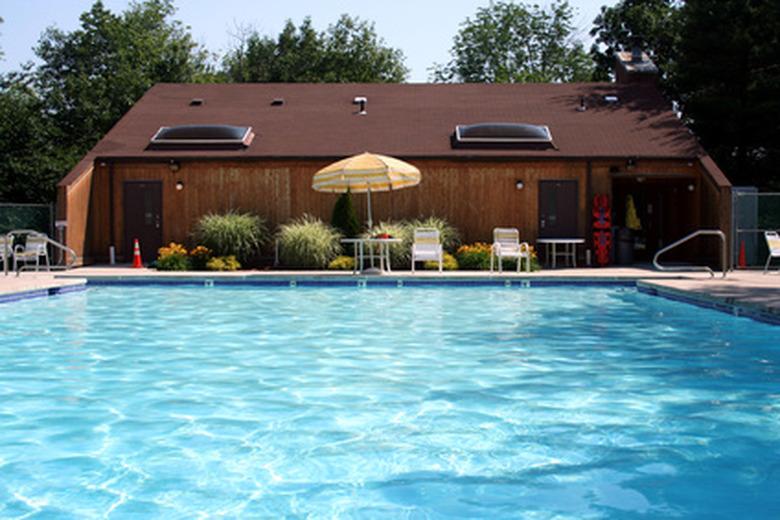Pros & Cons Of A Chlorine Pool
Effective and inexpensive, chlorine is the disinfectant of choice for most pool owners. A traditional swimming pool that uses added chlorine to disinfect the water is known as a chlorine pool. But even the other common pool types_—_saltwater and bromine—sometimes need added chlorine in order to stay clean. In a saltwater pool, for example, while much of the chlorine is generates through chemical reactions with salt, additional chlorine is sometimes needed when the natural chlorine production lags.
Though the chlorine pool is king for good reasons, it does have some disadvantages you should be aware of.
Advantages of Chlorine Pools
Advantages of Chlorine Pools
The simplest reason to choose a chlorine pool is that simply adding liquid or solid chlorine works very well as a means for disinfecting water. Chlorine is extremely effective at killing both bacteria and algae. If bacteria or algae is introduced to your pool, turning it green and murky, getting rid of the contaminants is a simple matter of shocking the pool with some extra chlorine to take care of the problem.
Chlorine pools also cheaper options than the alternatives. Saltwater pools are far more costly to install and maintain, and they may be prohibitively expensive for many homeowners. And because chlorine is so readily available and well understood, it's easy to find qualified pool professionals to maintain your pool. Saltwater pools are more corrosive and may damage poolside decking and furnishings over time.
Summary of Advantages
- Chlorine pools are cheaper to install
- Maintenance help is easy to find
- Chlorine is a very effective sanitizer
- Won't damage pool decks and furniture
Disadvantages of Chlorine Pools
Disadvantages of Chlorine Pools
When chlorine interacts with bacteria in pool water, it chemically changes and becomes chloramine. Chloramine is the reason that chlorine pools often have a distinctive smell—it is not the free chlorine that causes the smell, but the combined chlorine (chloramine) that causes the familiar chlorine smell. It is also the reason that pools sometimes irritate a swimmer's eyes and skin. These problems are usually not an issue with a saltwater pool.
Chlorine pools don't self-regulate well, which means you'll have to test and adjust your pool water balances more often than you might with other sanitizing systems. At a pH of 7.8 or higher, chlorine loses its effectiveness, requiring that you add additional chemicals to your pool. Without the help of a chlorine stabilizer, such as cyanuric acid, chlorine quickly evaporates in sunlight. And users must remember that chlorine is inherently a toxic chemical that requires responsible handling.
In short, a chlorine pool requires a user to treat the pool with other chemicals as well as the chlorine. With other pool types, the use of chemicals is substantially less.
Summary of Disadvantages
- Requires ongoing water testing and maintenance
- Creates skin- and eye-irritating chloramines
- May create a strong odor
- Requires careful handling
Non-Chlorine Pools?
Non-Chlorine Pools?
All swimming pools require some interaction with chlorine at different levels. the most common alternative, the saltwater pool, uses a chlorine generator to turn salt into chlorine. Bromine, UV filter, and ozone systems all require some chlorine, as well.
Natural pools and those using advanced oxidation techniques are the only ones that don't use any chlorine. The first is expensive and requires a large amount of space, while the second is difficult to install, since few contractors have experience with advanced oxidation systems.
Summary
Summary
Chlorine pools offer an easy, effective, and affordable way to keep swimming pools sanitized. If you monitor your chlorine levels properly, you can avoid the red eyes and dry skin the chemical is known to cause. You'll also eliminate the chloramine smell people often associate with chlorinated pools.
Chlorine does need to be handled carefully, however, and you must be diligent in your pool water testing. Owning a chlorine pool also means you will be testing the water constantly and must get comfortable and skilled with handling other chemicals, as well. If you want to minimize the work of having a pool or use as few chemicals as possible, a chlorine pool isn't the best choice.
